2018 Year in Review

In 2018, a big part of my goal was to spend more time working on projects at the intersection of my main area of training (HCI) and AI. To do this, my strategy was to aggressively embrace learning opportunities, work on new projects and engage with the AI community (conferences ... and Twitter!).
This year I ..
- Worked through 3 online AI courses (Coursera's Deeplearning.ai specialization, Udacity Intro to Self Driving Cars, Pytorch Scholarship Challenge) ... numerous lectures on youtube. I really enjoyed and recommend the Stanford Lecture videos on Convolutional Neural Networks for Visual Recognition and Natural Language Processing with Deep Learning (link updated to the 2019 version).
- Attended 7 conferences (AAAI, NVIDIA GTC, Tensorflow Dev Summit, JupyterCon, Deep Learning Indaba, HLF Forum, NeurIPS). Presented a poster or full presentation at 5 of these conferences.
- Worked on a couple of AI related projects with some incredible colleages. I wrote blog posts on the most interesting ones were Data2Vis --- Automated Generation of visualisations using Seq2Seq networks, Hand tracking using Object detection models, Generating African Masks using GANs. I also co-wrote 3 AI-related papers (see here, here, here) this year with some amazing colleagues. 2 of these papers were recognized with best paper awards.
- Wrote 4 blog posts (lined above) with sample code on projects I really care about.
The Good: Learning, Writing, Recognition
Stubbornly engaged with new material this year.
Learning
Confession: The self-taught "deep learner"
While I do have a PhD in Information Systems (with courses in stats and data analysis needed for social science research), much of my education in deep learning has been online and self-directed (see an interesting discussion on this here). In no particular order, I am indebted to courses like CS231n (Convolutional Neural Networks for Visual Recognition), the Coursera deeplearning.ai specialization, Pytorch Scholarship Challenge on Udacity, a slew of well written papers published on arxiv and generous authors who provided sample code for their projects. The self learning journey is still very much in progress.
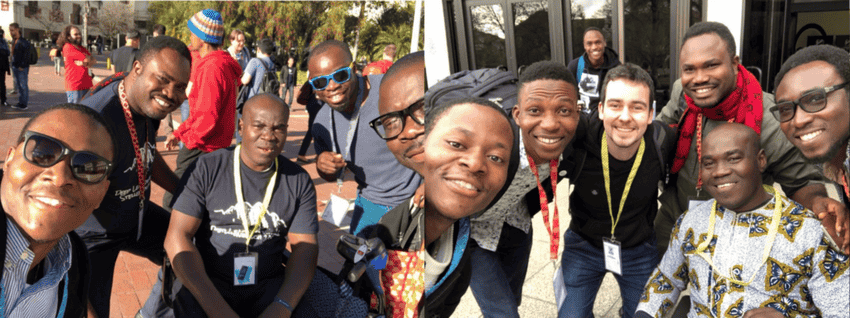
Conferences
I found conference to be a great way to engage with new concepts and build intuition. Applied AI, in many ways, is a highly experimental discipline with MANY moving parts. I found intuition to be the glue that keeps it all together. At first, some concepts felt foreign. Repeated engagement during conference sessions made them more familiar, and then intuitive. To further engage with material I encountered, I took notes and wrote a blog post on all 7 conferences I attended. I only managed to clean up and publish 4 of those notes ---[AAAI, NVIDIA GTC, JupyterCon, and Deep Learning Indaba]. I also served as an area reviewer for AAAI (HCI area) program committee for NeuRIPS blackinAI group and a few other conferences.
Community
I got to meet wonderful individuals at many of these conferences and found new appreciation for all the hardwork that goes into organizing communities. Particularly the Black in AI, Deep Learning Indaba and Twitter community have been amazing. Twitter was a great way to keep track of conversations, filter important research papers and learn about opportunities.
Writing
-
Publications I am grateful for the support and mentorship I received from colleagues with whom I worked on a papers this year. Our work on "A Cognitive Assistant for Visualizing and Analyzing Exoplanets" was published as a demo at AAAI, and work on "Data2Vis: Automatic Generation of Data Visualizations Using Sequence to Sequence Recurrent Neural Networks" was published at the IEEEVis Symposium on Visual Data Science.
-
Blog Posts and Github Code
My learning has benefited immensely from sample code and tutorials written by others. This year I spent some time paying that forward. I wrote about the following topics and provided my code on Github [Realtime hand tracking using Tensorflow Object detection api, Body-as-input gesture based interaction, Automatic generation of visualizations using Sequence to Sequence Neural Networks, ART+AI: Generating African Masks using GANs].

Recognitions
This year had some really happy moments where my work was recognized. I was one of 200 invited young researchers at the 2018 Heidelberg Laureate Forum where I facilitated a workshop; our work AAAI paper was recognised with a best demo paper award and our paper at IEEVis VDS was recognised by a best paper honorable mention award.
The Tough - Rejections
This year, I also got a slew of rejections. I was not accepted at several summer school applications (CIFAR, JEJU, PAISS... and others), turned down by the Harvard BKC center for the 2018 fellowship program, unsuccessful at a few project/grant submissions and had at least 3 papers rejected this year .. amongst other things. As an academic, paper rejections are expected from time to time. But it still stings every-time.
The Next - Onward to 2019
2018 has been amazing. Cheers to all the things that worked out, and thankful for all the lessons from things that did not.
I hope to double down on the same focus areas --- work on more projects, build expertise in Applied AI and contribute more to the community (tutorials, code, talks, community service). I will also be spending more time with family and physical fitness!
Cheers to the new year!
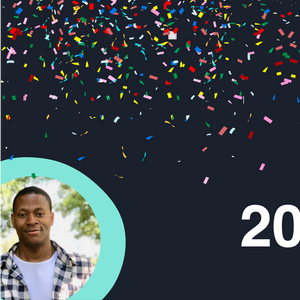 2021 Year in Review
2021 Year in Review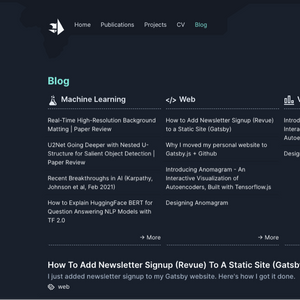 2019 Year in Review
2019 Year in Review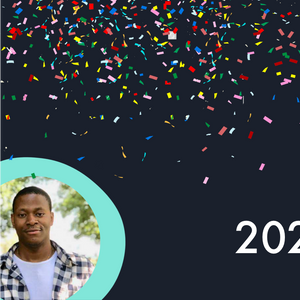 2020 Year in Review
2020 Year in Review 2023 Year in Review
2023 Year in Review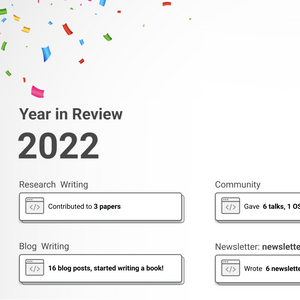 2022 Year in Review
2022 Year in Review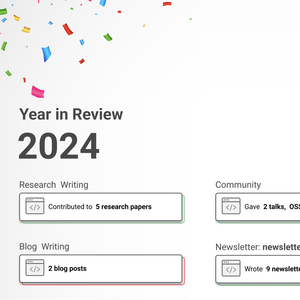 2024 Year in Review
2024 Year in Review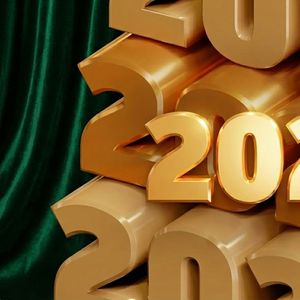 2025 Year in Review
2025 Year in Review Top 10 Machine Learning and Design Insights from Google IO 2021
Top 10 Machine Learning and Design Insights from Google IO 2021